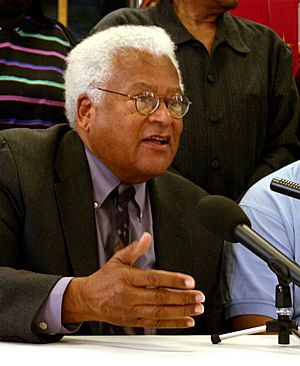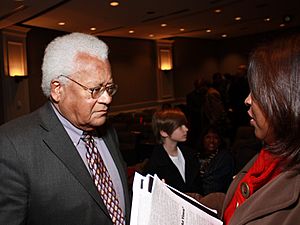James Lawson facts for kids
Quick facts for kids
James Lawson
|
|
|---|---|

Lawson in 2005
|
|
| Born |
James Morris Lawson Jr.
September 22, 1928 Uniontown, Pennsylvania, U.S.
|
| Died | June 9, 2024 (aged 95) Los Angeles, California
|
| Education |
|
| Occupation | Activist, professor, minister |
| Known for | Nashville sit-ins |
James Morris Lawson Jr. (born September 22, 1928 – died June 9, 2024) was an important American activist and teacher. He was a key thinker and planner for using nonviolence during the Civil Rights Movement. In the 1960s, he guided young people in the Nashville Student Movement and the Student Nonviolent Coordinating Committee. He was asked to leave Vanderbilt University in 1960 because of his civil rights work. Later, he served as a pastor in Los Angeles for 25 years.
Contents
Early Life and Learning
James Lawson Jr. was born on September 22, 1928, in Uniontown, Pennsylvania. He was one of nine children and grew up in Massillon, Ohio. Both his father and grandfather were Methodist ministers. James got his license to be a minister in 1947, while still in high school.
While studying at Baldwin Wallace College, he learned about how societies work. He believed in peace and refused to join the U.S. military when he was called. Because of this, he spent 13 months in prison. After returning, he finished his degree. He joined groups like the Fellowship of Reconciliation (FOR) and the Congress of Racial Equality (CORE). Both groups taught people to fight racism using nonviolent methods.
He traveled to Nagpur, India, as a Methodist missionary. There, he studied satyagraha, which is a way of using nonviolent resistance. This method was developed by Mohandas Gandhi. When he came back to the United States in 1956, he went to Oberlin College. One of his teachers introduced him to Martin Luther King Jr.. King also believed in Gandhi's ideas of nonviolence. In 1957, King asked Lawson to move south, saying, "Come now. We don't have anyone like you down there." So, Lawson moved to Nashville. He went to Vanderbilt University and began teaching people how to protest peacefully.
Lawson studied at Oberlin College from 1956 to 1957. After a year, he married Dorothy Wood, and they had three sons. He attended Vanderbilt from 1958 to 1960. He was expelled from Vanderbilt in March 1960 because of his civil rights actions. However, he earned his degree from Boston University that same year. Lawson then became a pastor at the Scott Church in Shelbyville, Tennessee.
Leading the Civil Rights Movement
Lawson moved to Nashville, Tennessee, and joined the Divinity School at Vanderbilt University. He was the southern leader for CORE. In 1958, he started holding workshops in a church basement. These workshops taught people how to use nonviolence for the Southern Christian Leadership Conference. In Nashville, he met and guided many young students from Vanderbilt, Fisk University, and other schools. He taught them how to take nonviolent direct action.
He trained many future leaders of the Civil Rights Movement. These included Diane Nash, James Bevel, Bernard Lafayette, Marion Barry, and John Lewis. In 1959 and 1960, these activists, trained by Lawson, started the Nashville sit-ins. They challenged segregation in downtown stores. In February 1960, after students sat at lunch counters in Greensboro, North Carolina, Lawson and others were arrested. Their actions helped desegregate some lunch counters.
Lawson was expelled from Vanderbilt because he took part in these activities. A newspaper publisher and university trustee, James Geddes Stahlman, published misleading stories. Another trustee, John Sloan, supported expelling him. The university's leader, Chancellor Harvie Branscomb, made the decision. Later, Branscomb regretted his choice. In 2006, Vanderbilt apologized for how it treated Lawson. Lawson returned to teach at Vanderbilt from 2006 to 2009.
Lawson's students played a big role in many important events. These included the Freedom Rides, the March on Washington, and Freedom Summer. They also helped with the Mississippi Freedom Democratic Party and the Children's Crusade in Birmingham. In 1962, Lawson brought Martin Luther King Jr. and James Bevel together. They agreed to work as equals. Bevel then became a director for the SCLC.
In 1961, Lawson helped plan the strategy for the Freedom Riders. These riders were people who rode buses into the South to challenge segregation. Lawson encouraged students to continue the rides from Alabama. He joined the group himself. They arrived safely in Jackson, but were arrested for using a "whites only" waiting room. Lawson and others refused to pay bail and stayed in jail. The judge found them all guilty. Lawson and the Freedom Riders met with Attorney General Robert F. Kennedy. In September 1961, President John F. Kennedy ordered that passengers could sit anywhere on buses.
Lawson became a pastor in Memphis, Tennessee, in 1962. In 1968, black sanitation workers went on strike. They wanted higher wages and union recognition after two co-workers died. Reverend Lawson led their strike committee. He also invited Dr. King to speak in Memphis. King gave his famous "Mountaintop" speech there. King was killed in Memphis in April 1968.
Later Work and Legacy

Lawson moved to Los Angeles in 1974. He was a pastor at Holman United Methodist Church. He retired in 1999 but kept working for civil rights. In Los Angeles, he was active in workers' rights, the American Civil Liberties Union, and movements for reproductive choice and gay rights. He also hosted a radio show called Lawson Live. On the show, he talked about human and social rights. He continued to teach nonviolence. He supported immigrants' rights, the rights of Palestinians, and workers' rights to a living wage.
In January 2007, Lawson took part in a special Freedom Ride program. It was sponsored by Vanderbilt University. The program included a bus tour to Montgomery and Birmingham, Alabama. Other Civil Rights activists like Jim Zwerg and Diane Nash also joined. Many students, teachers, and staff from several universities participated.
He helped lead California State University Northridge's (CSUN) Civil Discourse and Social Change initiative. He was a visiting teacher there from 2010 to 2011. He continues to be a visiting scholar. This initiative built on CSUN's history of activism and diversity.
The International Center on Nonviolent Conflict held a program on civil resistance. Lawson led this program in Nashville in 2013 and 2014. A class taught by Lawson and others at UCLA inspired students to write a book. The book, Nonviolence and Social Movements, shares the ideas of nonviolence and social change that Lawson taught.
His Death
James Lawson died in a hospital in Los Angeles on June 9, 2024. He was 95 years old. His death happened just before the 60th anniversary of the Civil Rights Act of 1964's filibuster being broken.
Honors and Recognition
In 2004, he received the Community of Christ International Peace Award. On December 10, 2021, UCLA announced that its Labor Center building would be renamed the UCLA James M. Lawson, Jr. Labor Center. This was to honor his long work for worker rights.
On April 24, 2019, Portland, Oregon, declared that day Reverend James Lawson Jr. Day. This was done in a ceremony at City Hall. That night, Rev. Lawson gave a speech at Portland State University. This began five days of the 6th James Lawson Institute.
On July 28, 2023, James Lawson High School opened in Nashville, Tennessee. A one-mile stretch of Adams Boulevard near Holman United Methodist Church was renamed in his honor in 2024.
See also
 | William Lucy |
 | Charles Hayes |
 | Cleveland Robinson |

